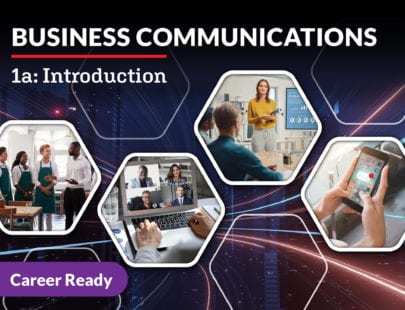
Sports and Entertainment Marketing 1b: Promoting the Main Event
Get ready to drop your spectator status for an all-access pass to enter the exciting world of sports and entertainment marketing! In this course, you’ll secure a solid foundation of effective marketing by studying the different roles and levels and how they relate to one another. Then, you’ll explore the modern marketing methods professionals use to take an event concept and make it successful. Finally, you’ll get up to speed on industry terminology and touchpoints with the help of HR. Get ready to flash that pass and gain all-star access to the stage and arena!
Units at a Glance
Unit 1: The Global Market
The world of Sports and Entertainment Marketing is a thriving and exciting field, one wherein the sports sector and the entertainment sector are combined together to form an ever-changing product that’s in very high demand—and that demand is only growing! The increasing demand for this specialized product all comes down to one thing: marketing. In this course, we will delve deeper into the marketing magic that professionals use for sports and entertainment products. By utilizing various marketing resources and combining them with a big picture of the organization, professionals can develop rich and robust marketing plans. This course will teach you how these same professionals create and implement effective marketing strategies that work to promote powerful sports and entertainment brands.
What will you learn in this unit?
- Identify sports and entertainment sectors, with a focus on athlete classifications
- Outline the economic impact of sport tourism
- Research and develop the elements required to host a mega sports and entertainment event
- Recognize the responsibilities of sports governance, from grassroots to international sports competition
Unit 2: Brand Marketing
The essence of successful marketing is knowing what your customers want and need, and then developing strategies that encourage their loyalty to your company and product. That might sound simple enough, but the fact that approximately half of all new businesses fail within the first five years paints quite a different picture. The challenge, it turns out, is in clearly determining those wants and needs and understanding how they can best be met. In this unit, we will focus on how to do just that. We’ll discuss how successful businesses work to build a personality, or an idea of what is possible, around the product to meet that challenge. By learning to identify the customer, understand their wants and needs, and then meet those wants and needs, a company can beat the odds to become a success story and not just another statistic.
What will you learn in this unit?
- Identify the elements of a successful marketing strategy
- Recognize the value that a strong brand represents
- Determine how to market different types of brands for optimal results
- Convey some of the benefits of brand extensions and partnerships
Unit 3: Professionalism in the Workplace
Working in the sports and entertainment industry can be a fun and exciting career. A job that includes watching live sporting events, attending concerts, and getting caught up in the hype of an array of marketing activities makes the sports and entertainment industry easily a top vote for many types of vocations. With so much fun and excitement involved, it’s easy to forget, especially from the fan’s perspective, that this is still a business—one that requires a professional approach. To be a successful professional in this industry, you must be able to communicate, solve problems, and make important decisions that keep the fans happy, the talent performing, and the revenue rolling in.
What will you learn in this unit?
- Explain how organizational diversity and culture can positively impact the workforce
- Identify individual skills required to work in the sports and entertainment industry
- Describe team skills required to work in the sports and entertainment industry
- Create a plan for developing career skills
Unit 4: Sales and the Customer
One of the best blueprints for sketching the nuts and bolts of the sales process in the sports and entertainment industry is the vending of tickets to a vast market eager to attend games, concerts, and sporting events. The target market for ticket sales in this industry is enormous, and salespeople working in this scene must work to understand the consumers and their particular buying habits in order to operate successfully in this competitive field. This unit will focus on the importance of relationship marketing, and along the way we’ll explore the impact that ticket sales has on the industry’s overall revenue. Finally, we’ll wrap up with ways that the savvy salesperson can customize both the product and the experience when dealing with different personalities to close the sale and keep customers coming back for more.
What will you learn in this unit?
- Explain sales activities used to generate profits at events
- Identify sales methodologies used in a successful ticket sales strategy
- Forecast and analyze trends to establish effective pricing strategies
- Qualify consumers and their buying habits to complete a sale
Unit 5: Distributing Sports and Entertainment Products
Sports and entertainment can both be delivered to the consumer in a variety of formats. One consumer might walk into a retail store to buy their favorite team’s jersey. Another person might be looking for a different workout experience, so they opt to purchase home equipment and sign up for online fitness programs. A group of friends might all pitch in to livestream a concert on a Saturday night, or a family might attend an afternoon baseball game together. Each of these scenarios is different, but they all require the guarantee that the product will be available for the consumer when and where they want it. This unit examines the many-sided steps and processes that take place behind the scenes to ensure that the consumer has access to the products they want—and when they want them.
What will you learn in this unit?
- Differentiate between the different roles and responsibilities in the distribution of products
- Recognize distribution channels and logistical challenges in the distribution of sports and entertainment goods
- Identify intermediaries specific to the distribution of sports and entertainment events
- Qualify distribution methods for film and event entertainment
Unit 6: Market Research
Do you have a favorite brand of shoe? People tend to stick with a particular brand of shoe for years, decades, or even all their lives. But what makes someone decide to buy one brand of shoe, like Nike, instead of another brand, like Puma? Or are you someone who prefers another brand of shoe altogether—perhaps Adidas? Most people choose a product brand based on recommendations from friends or from feedback about the product from other users. In other words, they’ve done some kind of research and made an informed decision. It turns out that business organizations also operate in much the same way when deciding how best to spend their resources to attract potential and returning customers. They conduct research, use the data to develop a marketing strategy, and then spend their dollars on what they expect to be sound business decisions. That is the meaning of market research. In this unit, we will see how this process works and take a closer look at its role in sports and entertainment.
What will you learn in this unit?
- Develop a research plan to gather data that contributes to the marketing plan
- Identify how market analyses result in shaping better business decisions
- Analyze benefits of a marketing information system (MIS) in interpreting data
- Recognize risk management and its role in sports and entertainment.
Unit 7: The Fine Print: Legalities and Ethics
Understanding how the law impacts your work can be the difference between becoming a story of business success and the risk of realizing far too late that ignorance of the law is no excuse for neglecting its regulatory reach. Well, why not just pay lawyers to handle all your business affairs? That seems the easiest way to go, right? Unfortunately, it’s not that simple. Organizations whose leaders and employees fail to understand the contractual law as it applies to their business dealings risk costly lawsuits that can destroy an otherwise thriving company. In this unit, we will explore some legal and ethical requirements that everyone operating in the workforce should know, and then we’ll focus more closely on those requirements that pertain to the sports and entertainment industry in particular.
What will you learn in this unit?
- Determine differences between legal and ethical requirements for business
- Analyze the critical elements of event contracts
- Recognize employment and endorsement contracts and how they differ
- Define different laws that impact product marketing
Unit 8: The Marketing Plan
Experience shows us that marketing can make all the difference between business success and business stagnation—or, even worse, business failure. A sound marketing plan is the key to better brand awareness, rising revenue, and improved profits for any organization that can execute that plan effectively. But to execute a marketing plan effectively, every team member participating in the plan must embrace the overall strategy that supports the plan while being able to embody a commitment to the standards of the plan that are set and maintained by the marketing professionals. If a company can combine the strands of character, commitment, and consistency, then that can only spell success for any sound marketing plan. This final unit will unite the key concepts covered throughout this course by using them to inform the research methods and invest in the strategic processes that signal the merits of a sound marketing plan. But moving beyond merely producing a sound marketing plan, the unit will also present ways to implement the marketing plan and provide methods for the important process of evaluating the plan and incorporating potential revisions to the plan whenever necessary. And in the final lesson, you will have the opportunity to create a comprehensive marketing plan for your own product or service that’s designed for business success—all by simply following the advice of marketing experts!
What will you learn in this unit?
- Recognize how the marketing plan fits within the overall business plan
- Define the target market as it applies to your product
- Develop a marketing strategy that supports the implementation of the marketing plan
- Create a marketing plan that focuses on effective planning, implementation, and evaluation
Required Materials
Software
- Word processing software
Optional
- Art supplies (optional)
- Audio recording device (optional)
- Digital camera (optional)
- Graphic design software (optional)
- Spreadsheet software (optional)
- Timeline creation software (optional)
- Video recording device (optional)



